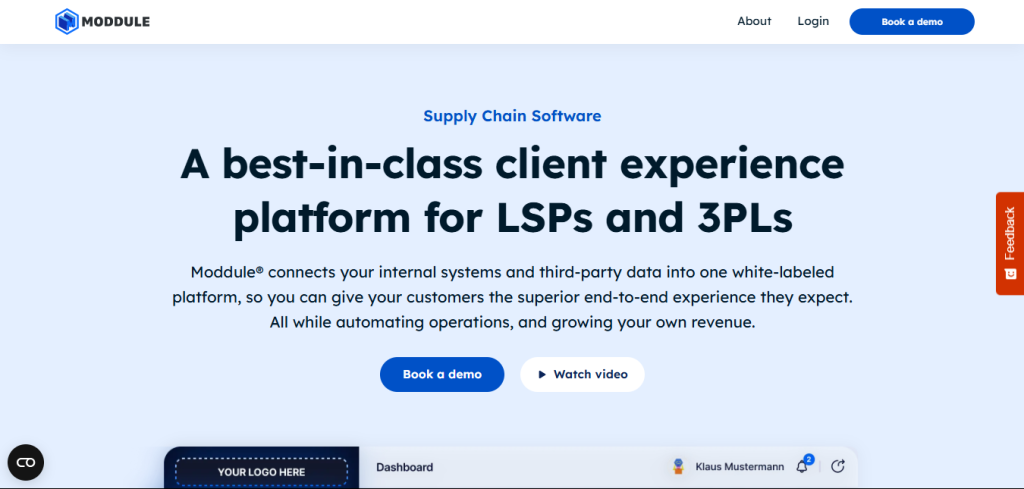Moddule Raises $1.5M in Pre-Seed Funding to Reinvent Client Experience for Logistics Providers
July 10, 2025
byFenoms Startup Research

Moddule, a supply chain tech startup building a client experience platform for logistics service providers (LSPs) and third-party logistics (3PL) companies, has raised $1.5 million in pre-seed funding to accelerate product development and commercial expansion.
The round was backed by leading early-stage investors, including Argon Ventures, Signal Ventures, Motion Ventures, Incisive Ventures, R7 Ventures, and Companyon Ventures. The founding team - Hans Elmegaard, Benjamin Jones, and Kasper Hansen - brings together deep experience in freight, SaaS, and customer-centric design.
Solving the Logistics Experience Gap
The logistics industry is highly operational - but its customer-facing systems are often stuck in the past. Legacy portals, disconnected tracking tools, and siloed communication channels make it difficult for LSPs and 3PLs to offer a modern, cohesive client experience.
Moddule addresses this head-on with a white-labeled platform that unifies a logistics provider’s internal data and third-party integrations into a seamless, brand-forward interface for their customers. Whether it's live tracking, document access, or real-time messaging, Moddule enables logistics companies to deliver an Amazon-like customer experience, without having to build it from scratch.
Why This Funding Matters Now
The logistics tech market is booming - but also becoming saturated with visibility tools, warehouse automation, and freight marketplaces. What’s been neglected is arguably the most important piece of all: how clients interact with the logistics providers managing their supply chain.
According to Accenture, over 60% of logistics buyers now factor digital service quality into their vendor decisions, and 81% would switch providers for a better digital experience. In an era of rising client expectations and shrinking margins, experience has become a revenue lever - not just a retention strategy.
And here’s the piece most early-stage founders overlook: experience layers compound faster than backend features. While operational tools compete on marginal efficiency, Moddule competes on brand perception and ease-of-use - assets that compound with every client interaction. It’s a strategy rooted in this truth: in B2B, delight is stickier than functionality. When clients rely on your platform as their primary touchpoint - not just a utility - you’ve moved from vendor to partner.
Moddule doesn’t just make logistics look better - it makes providers feel modern, responsive, and premium in a commoditized market. That’s where pricing power hides. For founders, the takeaway is this: owning the interface is the fastest path to owning the relationship - especially in industries where most software is invisible or painful to use.
Meet the Founders: Domain Meets Design
Hans Elmegaard, Benjamin Jones, and Kasper Hansen are building Moddule on the belief that experience-first logistics is the future. With backgrounds in logistics operations, customer success, and product design, the trio brings a rare blend of executional grit and UX obsession to a traditionally industrial sector.
Their approach emphasizes fast deployment, API-first extensibility, and user delight - a formula rarely seen in freight, where Excel sheets and PDF emails still dominate.
Industry Outlook: A $13T Sector in a UX Revolution
The global logistics industry is forecast to grow from $9.3 trillion in 2023 to $13.7 trillion by 2028, according to IMARC Group, driven by the explosion of e-commerce, global trade complexity, and automation. However, despite this growth, less than 25% of logistics companies offer digital self-service tools to their clients, according to a 2022 McKinsey report.
At the same time, customer experience has become a competitive differentiator: Gartner reports that 89% of companies now compete primarily on customer experience, even in B2B verticals like freight and logistics. But the gap remains wide - especially among small and mid-market LSPs who lack the tech teams or budgets to build polished client portals internally.
This is where Moddule thrives. Instead of replacing legacy infrastructure, it wraps around it - offering a scalable, future-proof interface that can be branded, configured, and deployed in weeks. As more supply chain partners demand transparency, speed, and engagement, Moddule is uniquely positioned to standardize client experience across fragmented backend systems.
Moreover, with B2B buyers expecting B2C-style experiences (think shipment updates, real-time chat, document downloads), the pressure is mounting on providers to catch up. Moddule bridges that gap - without requiring an internal product team or a multi-year transformation budget.
What’s Next for Moddule?
With the new capital in place, Moddule plans to:
- Expand its engineering and product design teams
- Launch deeper integrations with TMS and ERP systems
- Add self-service onboarding tools for smaller LSPs and freight teams
- Build out analytics features that offer actionable insights on customer engagement and service performance
The team is also preparing for select early enterprise pilots, targeting mid-size 3PLs and digital freight brokers in Europe and North America.
As logistics continues its shift from backend cost center to customer-facing differentiator, Moddule is poised to become the digital layer that connects the dots between operations and experience.
